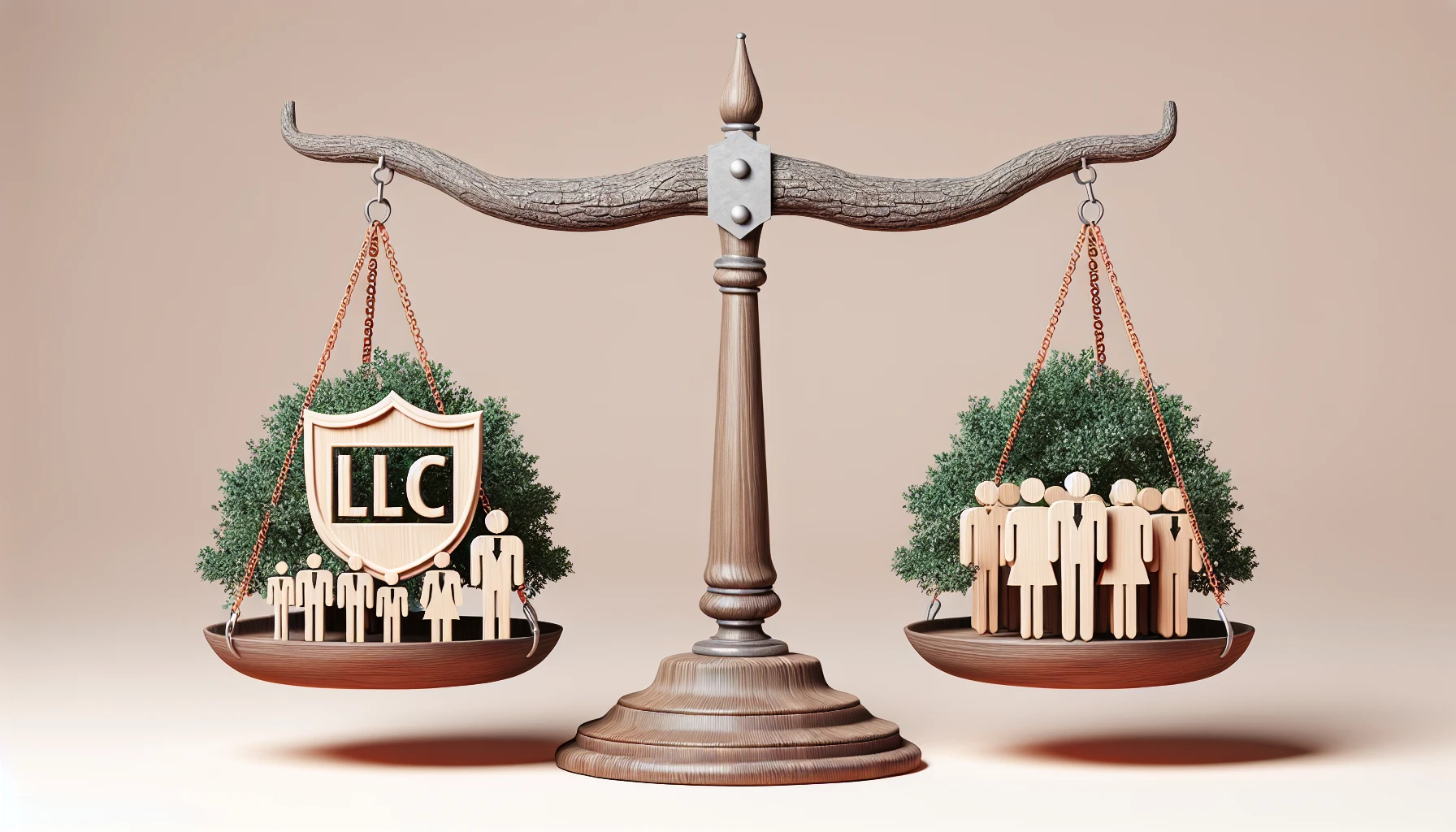As a Florida-licensed attorney with over a decade of experience in business formation and structure, I, John Montague, am well-versed in the pivotal decisions that shape the success of a new business. Starting a business is not just an entrepreneurial venture, but a journey laden with critical choices that can profoundly influence your future success. Among these, selecting the appropriate business structure stands out as one of the most significant decisions. In this comprehensive guide, I’ll share my expertise to illuminate the crucial differences between limited liability companies (LLCs) and corporations. Understanding these differences is essential for any entrepreneur poised to make an informed decision in the ongoing “LLC vs Incorporated” debate.
This guide dives deep into the nuanced aspects of LLCs and corporations, exploring their legal structures, the extent of liability protection they offer, ownership considerations, and the distinctions in taxation. We’ll also examine the specifics of formation documentation, management dynamics, strategic considerations, and the legal liabilities associated with each type of business entity. Equipped with this in-depth knowledge, you’ll be better positioned to select the business structure that aligns seamlessly with your unique objectives and needs, especially when considering the key points in the “LLC vs Incorporated” comparison.
By the end of this guide, you’ll have a clear understanding of both LLCs and corporations, empowering you to navigate the complexities of business formation and management with confidence and clarity.
Key Takeaways
- Understand the differences between LLCs and corporations in terms of legal structure, liability protection, ownership considerations, taxation implications & formation requirements.
- Evaluate growth prospects & personal income to decide which entity is best for your business goals.
- Ensure proper documentation & adhere to regulations to protect against potential personal liabilities.
Deciphering LLC and Incorporated: Key Differences

LLCs and corporations are distinct business entities, each offering its own set of advantages and disadvantages. While both provide limited liability protection for their owners, their legal structures, liability nuances, and ownership considerations differ significantly, making them suitable for different business needs.
Forming an LLC or corporation can shield you from personal liability for the business’s debts and other liabilities, providing a formal operating structure and increased credibility for your venture. Before making a decision, understanding the key differences between these business entities is beneficial. Consulting a business attorney can provide helpful advice on whether to form an LLC or a corporation.
Legal Structure of an LLC vs. a Corporation
An LLC is a flexible business structure that provides its owners with limited liability protection. It has fewer formalities than a corporation, such as not requiring the election of a board of directors, filing of an annual report, or holding of annual shareholder meetings. On the other hand, a corporation is a more rigid business entity with shareholders, directors, and officers. The company must comply with a set of stringent requirements. This includes the election of a board of directors, filing of an annual report, holding annual shareholder meetings, and abiding by the company bylaws..
Another significant difference between LLCs and corporations is the aspect of taxation. LLCs have the option to be taxed as pass-through entities, meaning that the business income is taxed at the owner’s personal level, avoiding corporate taxes. Corporations, by default, are taxed as C corporations and subject to double taxation, wherein the profits are taxed at the corporate level and again at the shareholder level when distributed as dividends.
Liability Protection Nuances
While both LLCs and corporations provide limited liability protection to their owners, there are nuances to consider. If a business owner provides a personal guarantee to secure a loan or other form of financing, their personal assets may still be exposed. Moreover, if a business owner is found to be negligent in their conduct, they may lose the limited liability protection offered by the LLC structure.
In the case of limited liability partnerships (LLPs), individuals are not shielded from their own negligence, but they do receive protection from the actions of their business partners. Understanding the nuances of liability protection is important in safeguarding your personal assets, no matter what the chosen business structure is.
Ownership and Investment Considerations
Ownership in LLCs is based on membership interests, which can be outlined in the operating agreement. On the other hand, corporations issue stocks to shareholders, with their ownership percentages determined by the number of shares they possess. Such differences in ownership structures can have significant implications for investment and transferability.
When it comes to transferring ownership, some states require that an LLC be dissolved and re-formed with the new members if any changes occur, making it crucial to have an agreement in place outlining the process for buying, selling, and transferring ownership. In contrast, shareholders in a corporation can easily transfer their shares to another party. These factors should be carefully considered when deciding between an LLC and a corporation, based on your business’s growth potential and investment needs.
Understanding Taxation: LLC vs. Corporate Tax Rates

Taxation is a critical aspect to consider when choosing between an LLC and a corporation. LLCs offer more flexibility and pass-through taxation, allowing the business income to be taxed at the owner’s personal level and avoiding corporate taxes. In contrast, corporations are subject to double taxation, where profits are taxed at the corporate level and again when distributed to shareholders as dividends.
For business owners, understanding how the taxation of your chosen business structure can directly impact your personal income and the business’s overall financial health is beneficial. We will further examine the tax nuances of LLCs and corporations, including how to pay personal income taxes and manage personal tax returns, to assist you in making a sound decision.
LLC Tax Flexibility
LLCs possess the ability to select their tax structure, either as a pass-through entity or as a corporation, which ultimately affects personal income and self-employment taxes.
- Single-member LLCs are taxed like sole proprietorships by default, which involves the self employment tax.
- Multi-member LLCs are taxed like partnerships.
- However, LLCs can also elect to be taxed as a corporation.
This tax flexibility can benefit LLC owners, as it enables them to select the tax structure that best suits their business needs. For instance, an LLC owner may opt for pass-through taxation to avoid double taxation or elect to be taxed as a corporation to potentially benefit from lower corporate tax rates. This versatility in taxation is one of the key benefits of choosing an LLC as your business entity.
Corporate Tax Obligations
Corporations, on the other hand, face more rigid tax obligations. By default, corporations are taxed as C corporations, which are subject to corporate income tax at the federal level, currently at 21%. Furthermore, corporations are susceptible to double taxation, wherein profits are taxed at the corporate level and again at the shareholder level when distributed as dividends.
It is worth noting that some corporations can elect to be taxed as S corporations to avoid double taxation, allowing for pass-through taxation similar to that of LLCs. However, not all corporations are eligible for S corporation status, and certain restrictions apply.
When deciding on the best business structure for your venture, it’s beneficial to understand the tax obligations associated with corporations.
Setting Up Your Business: Formation and Compliance

Both LLCs and corporations require specific formation documents and compliance with annual requirements to establish and maintain the legal status of your business. Proper documentation and adherence to legal regulations is key to the success and longevity of your business.
We will examine the formation and compliance requirements for both LLCs and corporations.
Formation Documentation
When forming an LLC, the required documents typically include the Articles of Organization, LLC Operating Agreement, and IRS Form SS-4. These documents must be filed with the state when establishing a business. The operating agreement delineates the ownership structure, management, and how the company will address a new or departing member.
For a corporation, formation documentation typically includes:
- Business name reservation form
- Articles of Incorporation
- Bylaws
- Shareholders’ Agreement (optional)
These documents must also be filed with the state when establishing a business. The internal governing provisions for a corporation are generally stipulated in the company bylaws.
Compliance and Annual Requirements
Both LLCs and corporations must adhere to annual compliance requirements, such as maintaining a registered agent and filing annual reports. For LLCs, the annual compliance requirements typically include filing an Annual Report, maintaining a registered agent and office, and paying any applicable franchise taxes. Some states may also require the preparation and submission of annual financial statements.
On the other hand, corporations face similar annual compliance requirements, including:
- Filing an annual report
- Maintaining a registered agent and office
- Foreign qualification if operating in multiple states
- Paying franchise taxes
- Filing an annual tax return
By adhering to these compliance requirements, you can ensure the legal standing of your business and avoid potential fines, back taxes, and other penalties.
Management and Operational Dynamics

The management and operational dynamics of LLCs and corporations vary, offering different levels of flexibility and control for business owners.
This section will discuss the management structures of both LLCs and corporations and their implications on daily operations and decision-making.
LLC Management Versatility
LLCs offer a versatile management structure, as they can be managed by the LLC members themselves or by appointed managers. This provides owners with the option to be actively involved in the daily operations and decision-making processes or to delegate these responsibilities to a manager or managers. The adaptability of the LLC ownership structure also allows for single or multiple members, further affecting the decision-making process.
This management versatility enables LLC owners to tailor the operational structure of their business according to their needs and preferences, providing more control and flexibility than a corporation’s rigid governance structure.
Corporate Governance
In contrast, corporations follow a strict governance structure, with a board of directors overseeing the business and officers managing daily operations. Shareholders in a corporation select a board of directors to make major decisions and supervise the company’s management. The board is responsible for formulating strategic objectives, appointing and monitoring senior management, and providing financial oversight.
The officers of a corporation are key management executives who report to the board of directors and oversee specific business functions based on their background and expertise. This more rigid governance structure may provide less flexibility and control for individual shareholders compared to the versatile management options offered by LLCs.
Strategic Considerations for Small Business Owners

Small business owners should consider factors such as growth prospects, funding needs, and personal income implications when choosing between an LLC and a corporation. The unique advantages and disadvantages of each business structure can impact the success of your business and your personal financial well-being.
Growth and Funding Prospects
Corporations may be more suitable for businesses seeking to scale and attract investors, as they offer a more complex ownership structure and are often preferred for businesses that intend to acquire capital from investors. Additionally, corporations can issue stock to generate capital and become publicly traded entities. Conversely, LLCs offer flexibility and are more suitable for smaller operations with lesser funding needs.
Considering the potential advantages and limitations of each business structure is important when evaluating your business’s growth and funding prospects. This can assist you in making a decision that aligns with your business’s goals and growth potential.
Personal Income and Business Transactions
Personal income and business transactions should also be considered when deciding on a business entity. In an LLC, the business income is taxed at the personal level, with profits and losses passed through to the owner’s personal income without personal income taxes applied at the corporate level. In a corporation, the business income is subject to corporate income tax, with profits distributed to shareholders as dividends being taxed again at the individual level.
Understanding the tax implications and liability protection that each business structure offers can assist you in making an informed decision, considering the potential impact on your personal income and the overall financial health of your business.
Navigating the Legal Landscape: LLCs, Corporations, and Legal Liability
Legal liability protection is a key factor in choosing a business structure. Both LLCs and corporations offer limited liability protection, shielding owners from personal responsibility for business debts and liabilities. However, it’s important to be aware of the potential risks and limitations associated with each business structure, as well as the significance of proper documentation and adherence to legal regulations.
The Shield of Limited Liability
LLCs and corporations both provide limited liability protection, ensuring that the owners’ personal assets are safeguarded from business debts and lawsuits. This protection is essential for business owners who want to minimize personal risk while growing their business. However, it’s crucial to understand that limited liability protection is not absolute and can be lost in certain situations, such as providing a personal guarantee for a loan or engaging in negligent conduct.
When choosing the right business structure for your venture, it’s important to understand the scope and limitations of limited liability protection. This understanding can assist you in making decisions to protect your personal assets and the financial well-being of your business.
Piercing the Corporate Veil
While limited liability protection is a significant advantage of both LLCs and corporations, owners should be aware of the potential risks and limitations associated with it. In certain cases, the court may “pierce the corporate veil,” holding owners personally liable for the company’s activities or debts if they have not treated the company as a distinct legal entity or have engaged in fraudulent or wrongful behavior.
Maintaining proper documentation, keeping personal and business finances separate, and adhering to all legal requirements and formalities of the chosen business structure is important to avoid the risk of piercing the corporate veil. Consulting a legal professional can provide guidance and advice on navigating the legal landscape of LLCs, corporations, and legal liability.
Selecting the Right Business Entity: Factors to Consider
When selecting the right business entity, it’s essential to consider factors such as:
- taxation
- liability protection
- management structure
- growth potential
- legal compliance requirements
Understanding the key differences between LLCs and corporations, along with the unique advantages and disadvantages of each business structure, can assist you in making a decision that will set your venture up for success.
Carefully evaluate your business needs, goals, and resources, and consult with a legal professional to ensure you select the best business structure for your unique situation. With the right foundation, you can confidently begin your entrepreneurial journey and build a successful business that meets your objectives and aspirations.
Summary
In conclusion, both LLCs and corporations offer unique benefits and drawbacks for business owners. LLCs provide more flexibility in terms of management and taxation, while corporations offer more rigid structures and may be better suited for larger businesses seeking investment. Understanding the intricacies of each business structure, from liability protection to growth potential and legal compliance, is crucial to making the best decision for your venture.
As you embark on your entrepreneurial journey, keep these factors in mind and consult with legal professionals to ensure you select the business entity that best aligns with your goals and aspirations. With the right business structure in place, you can confidently build a thriving venture that meets your objectives and paves the way to success.
Frequently Asked Questions
Is an llc a corporation?
An LLC is not a type of corporation, but a unique hybrid entity combining the simplicity of a sole proprietorship with the liability protections offered by a corporation. Depending on the election made and number of members, it may be taxed as a corporation, partnership or pass-through entity with profits flowing through to the business owner’s personal income.
What are the main differences between an LLC and a corporation?
The primary distinctions between an LLC and a corporation are their legal structures, liability protections, ownership considerations, taxation, and management structures.
How does the management structure differ between an LLC and a corporation?
The main difference in management structure between an LLC and a corporation is that an LLC is usually managed by members or managers, while a corporation is managed by a board of directors and officers.
What are the tax implications for LLCs and corporations?
LLCs are taxed at the owner’s personal level, while corporations are taxed at the corporate level and may face double taxation on dividends.
What are the formation and compliance requirements for LLCs and corporations?
Forming an LLC or corporation requires the submission of certain formation documents, while ongoing compliance involves maintaining a registered agent and filing annual reports.


